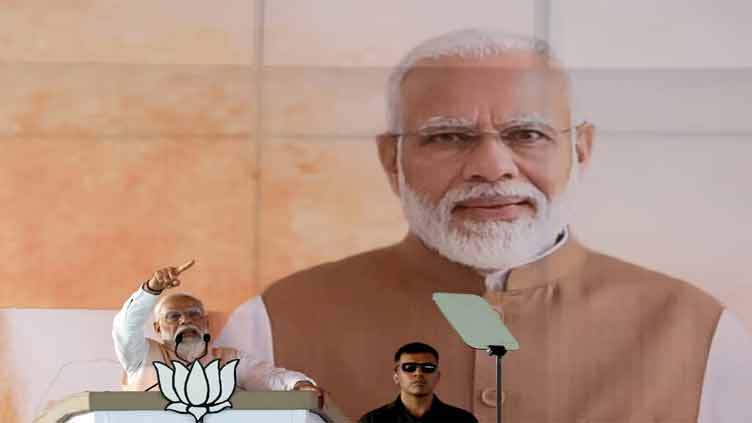India's Lok Sabha election 2024: the main political parties and candidates

World
The country has more than 2,500 political parties
INDIA (Reuters) - India, with nearly a billion eligible voters, will set off on the world's largest electoral exercise on Friday. The country has more than 2,500 political parties but just 10 of them hold 86% of all seats in the Lok Sabha, the lower house of parliament.
A serious contest between a few parties will likely be dominated by Prime Minister Narendra Modi and his ruling Bharatiya Janata Party.
BHARATIYA JANATA PARTY (BJP)
The BJP, the world's largest political outfit with nearly 180 million members, was born out of the Jan Sangh party, an offshoot of a men-only Hindu nationalist organisation, the Rashtriya Swayamsevak Sangh (RSS).
After struggling on the political margins early after it was formed in 1980, the BJP delivered its first prime minister 16 years later in an unstable government that lasted 13 days.
The party formed a government with a majority of its own for the first time in 2014 under Modi. It's been formidably in power since.
Narendra Modi: Modi, 73, was born and raised in a small town in the western state of Gujarat. He joined the BJP's ideological parent, the RSS, in his 20s and the Jan Sangh nearly a decade and a half later.
He's risen through the ranks over years and was Gujarat's chief minister for more than three terms before leading the BJP into a decisive victory in the 2014 general election.
A decade in power, Modi remains enduringly popular as he seeks a record-equalling third straight term. Pollsters predict an easy win for him and the BJP, powered by consistent wooing of the Hindu majority, strong economic growth and handouts.
Modi is seeking to be re-elected from Varanasi, a city of religious significance to Hindus in the populous northern state of Uttar Pradesh.
Amit Shah: A close Modi aide, Shah is India's home affairs minister - a position critical to matters of national security. He became the president of the ruling BJP in 2014 after Modi stormed to power and took up a cabinet position in Modi's second term in 2019.
Shah is credited with helping shepherd Modi's Hindu-first agenda such as stripping Muslim-majority Jammu and Kashmir of its special status as a state and implementing a contentious citizenship law that critics say discriminates against Muslims.
Shah is seeking to be re-elected from Gujarat's Gandhinagar, the capital of the state.
INDIAN NATIONAL CONGRESS
The Congress is India's oldest political party and governed India for more than two-thirds of the years since independence in 1947 but has struggled after Modi swept to power.
Congress gave its first and only woman prime minister, Indira Gandhi, and introduced comprehensive economic reforms in 1991 making way for the evolution of an open market economy.
But it crashed out of power in 2014 against the Modi onslaught and a series of corruption allegations.

Rahul Gandhi: Modi's fiercest opponent and Congress's star campaigner, Gandhi has never been a minister in a federal or state government, has not led his party to a general election victory, and quit as party chief after a miserable performance at the last parliamentary polls in 2019.
Yet he remains at the centre of India's opposition politics and Modi's main target. His father, grandmother and great-grandfather were all prime ministers and led the country for more than 37 years.
Gandhi, 53, is a four-time parliament member who has struggled to mobilise masses to support a wobbly 26-member opposition alliance he helped stitch together. He set off on two cross-country walks to invigorate his campaign and tap into disenchantment over lack of jobs, income inequality and rural distress.
Gandhi is fighting this election from Wayanad in the southern state of Kerala. The matriarch of the Nehru-Gandhi dynasty, Sonia Gandhi, has decided to not contest in this year's election.
AAM AADMI PARTY (AAP)
The Aam Aadmi or Common Person's Party emerged from a strong anti-corruption movement in 2011 that swelled amid protests led by Anna Hazare - a self-styled crusader backed by close aide Arvind Kejriwal.
Kejriwal formed the AAP in 2012 and formed a local government in the national capital Delhi in 2015, staging an unexpected political upset for established parties like the BJP and Congress. Kejriwal, who has been Delhi's chief minister since, is a staunch Modi critic and a Congress ally in the upcoming elections.
However, AAP's prospects are clouded by pre-election arrests of most of its high-profile leaders, including Kejriwal, in an alleged graft case.

The party that also runs Punjab state dismisses the allegations as "a desperate attempt to malign the image" of Kejriwal.
DRAVIDA MUNNETRA KAZHAGAM (DMK)
A strong regional force in India's south, the DMK is India's third-largest party in terms of the number of seats it holds in the lower house of parliament.
A Congress ally, DMK also runs Tamil Nadu state, where the poverty rate is 2%, one of the lowest in the nation, and boasts a high literacy rate.
ALL INDIA TRINAMOOL CONGRESS (TMC)
India's fourth-largest party by seats in parliament, the Trinamool Congress holds power in West Bengal in the east, another state the BJP has struggled to crack. The party came into being nearly 25 years ago after it splintered from the Congress.

Founder of the party Mamata Banerjee has been the state head for nearly 13 years and is now a reluctant Congress ally in fighting the BJP in the 2024 polls. Her party has joined the 26-member opposition bloc but failed to clinch an agreement over who will fight from which seat in the state.
One of the TMC candidates for the election is Mahua Moitra, a persistent critic of Modi. A former investment banker, Mitra was expelled from parliament last year over allegations of accepting bribes from a businessman in exchange for parliamentary questions. Mitra says the charges are trumped-up.


